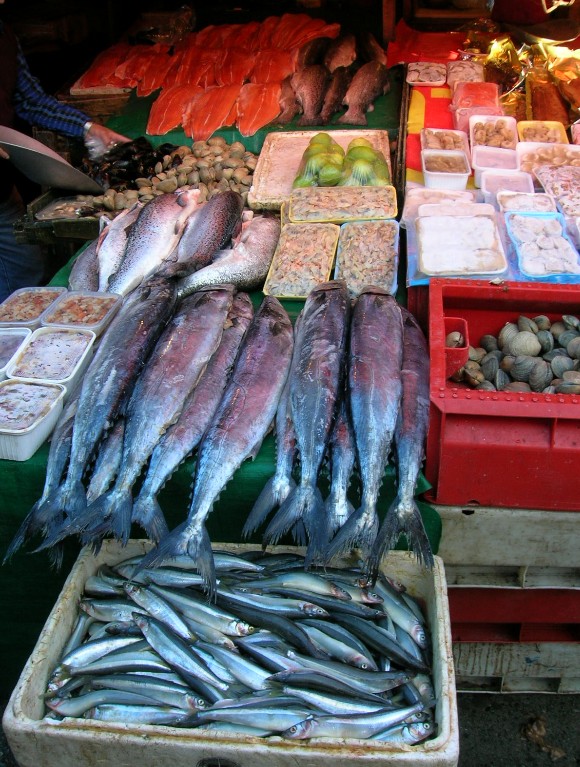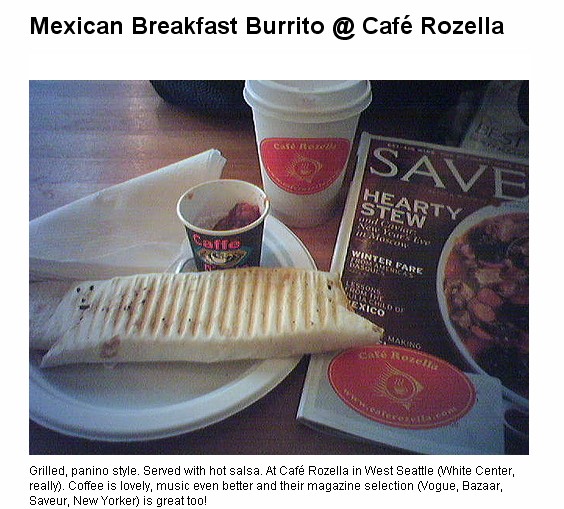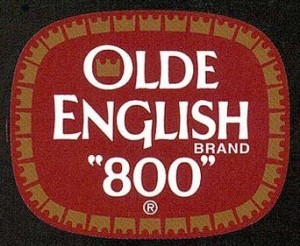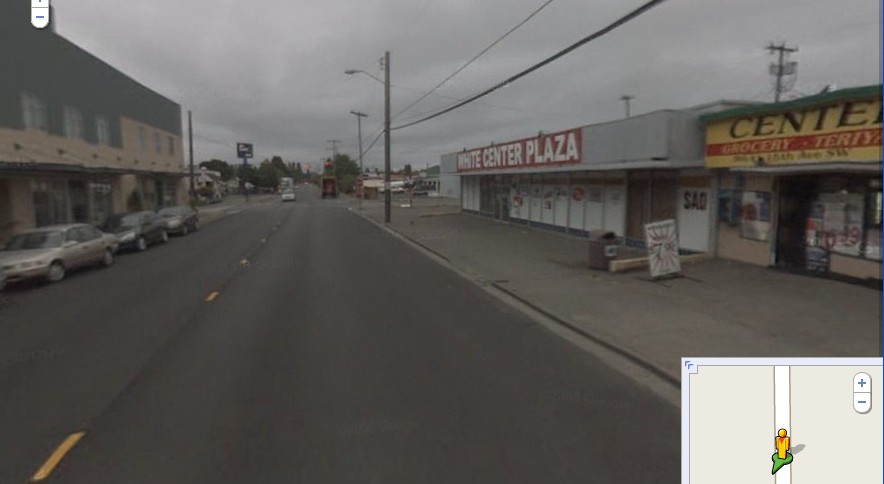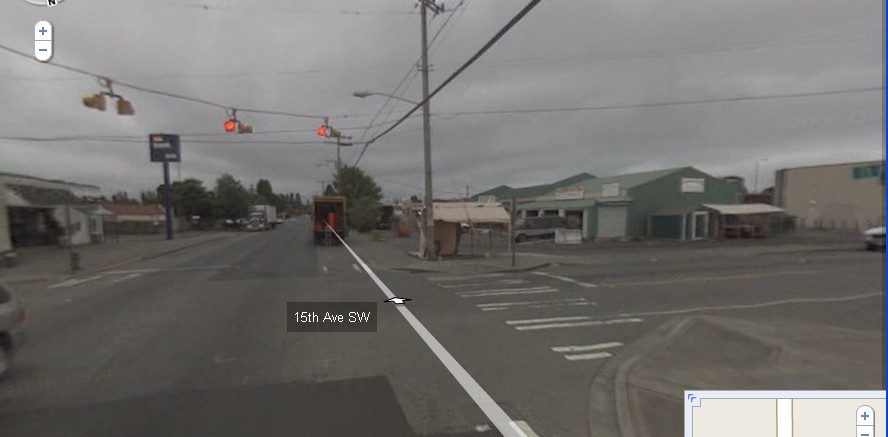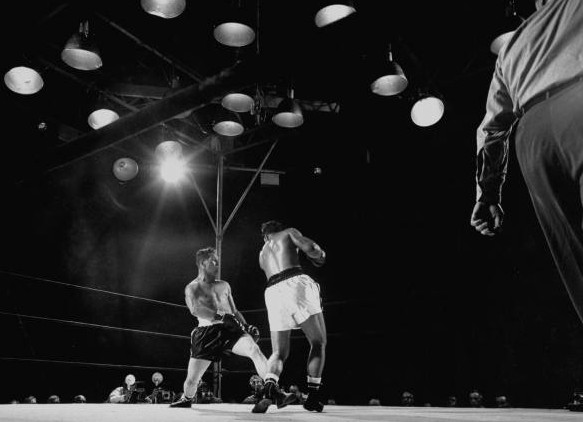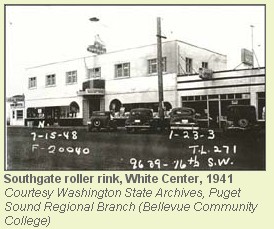One of the best things about White Center is the abundance of great food. The restaurants offer some of the tastiest array of food from around the world. What many may have missed are the wonderful Asian markets brimming with fresh fish, tasty meats, exotic fruits, vegetables and sauces. You can wonder around them for hours and pack away enough fresh ingredients for the choicest of meals. So, I will be posting a listing and review of Asian markets. If you have a favorite or a question, send it in and I will try and include it. Bon appetit!
Review of Asian Markets Coming
April 9th, 2009 Ricardo Posted in Businesses, Food, Sustainability, White Center 2 Comments »
Puget Sound Business Journal Takes Economic Pulse of White Center
April 6th, 2009 Ricardo Posted in Businesses, Economy, White Center, White Center news Comments Off on Puget Sound Business Journal Takes Economic Pulse of White Center
The Puget Sound Business Journal just published a story on the economic effects of the recession on White Center. Entitled, “White Center Shows Its Diversity,” the article quotes many business owners including this writer.
In the good days, just one year ago, lunch break at construction sites around White Center meant a flood of workers pouring into El Paisano for a taste of home.
Silva’s situation reflects a larger picture in White Center, a struggling, diverse neighborhood with many immigrants on the southwest edge of Seattle. Its downtown is an eclectic mix of Pho restaurants, taquerias, bars, pawn shops, tattoo parlors, and hair and nail salons, and many of these small businesses say they are now teetering on the brink.
At $40,480 a year, the median household income is 24 percent lower in White Center than the countywide average, according to the 2000 Census. The population is 21 percent Asian, 12 percent Hispanic, 6 percent African-American, 2 percent American Indian, and 2.6 percent Pacific Islander.
The article can be accessed online at its website.
Seattle Times Gives Thumbs up to White Center Food
April 2nd, 2009 Ricardo Posted in Businesses, Food, White Center 2 Comments »
The Seattle Times has a piece that profiles five of our many wonderful and diverse eateries and markets. Herein are excerpts from their piece:
White Center looks more like the south-end version of Seattle’s Chinatown International District every time we visit — only more diverse, with Halal meat markets and Latin American cuisine.
Lately, though, foodies have discovered White Center as the go-to area to pick up exotic spices and ingredients, especially if you want to avoid the traffic and crowds at the ID on weekends.
Nice that they noticed, but they should have mentioned the wonderful food at El Paisano Restaurant on 15th Ave. SW – just across from the Bartells.
Microfinance as a way to develop White Center
March 30th, 2009 Ricardo Posted in Businesses, Development, Economy, Jobs, White Center 1 Comment »
Most people are aware that the greatest impediment to the start and development of the business is lack of capital. Tradtionally, banks only lend money to people who already have money. This makes it extremely difficult for would-be entrepreneurs to start a business — even one that is desperately needed. One solution to this quandry is the pooling of resources by a community to assist its members with the initial loan that gives them entry. The Asian and Latino communities already have models of this practice, the latter known as Tanda. Variants of this practice are known broadly as microfinance.
Microfinance refers to the provision of financial services to poor or low-income clients, including consumers and the self-employed.[1] The term also refers to the practice of sustainably delivering those services. Microcredit (or loans to poor microenterprises) should not be confused with microfinance, which addresses a full range of banking needs for poor people.[2]
More broadly, it refers to a movement that envisions “a world in which as many poor and near-poor households as possible have permanent access to an appropriate range of high quality financial services, including not just credit but also savings, insurance, and fund transfers.”[3] Those who promote microfinance generally believe that such access will help poor people out of poverty.
I would be curious to know if readers have any thoughts on this subject and how it might used as a tool to spur economic development and vitality in White Center and other areas.
Homeownership for the Community – Thursday, April 9th @ 6 p.m
March 25th, 2009 Ricardo Posted in Development, Economy, housing, Real estate, White Center Comments Off on Homeownership for the Community – Thursday, April 9th @ 6 p.m
Homestead Community Land Trust (HCLT) will be holding a special Informational Session at the Greenbridge Library, 9720 8th Ave. S.W. on Thursday, April 9th from 6 to 7:30 p.m. for anyone interested in learning more about affordable homeownership opportunities.
Homestead is partnering with eligible homebuyers to create affordable homeownership in the White Center and Boulevard Park. How it works is the homebuyer selects a home that is FOR SALE and fits their needs and budget. They pay $100,000 less than the sales price, significantly reducing their monthly mortgage payment. In exchange for receiving the $100,000 –which does not have to be paid back – the homebuyer agrees that when they decide to sell, they will sell to another income eligible buyer at an affordable price. In this way, the community maintains a stock of affordable homes and the homebuyer passes on the affordability to the next buyer.
For example, a recent Community Land Trust homebuyer in White Center is paying $950/month as their housing payment for a 2 bedroom single family home with a large basement and detached garage. They have a stable monthly payment, have the opportunity to build equity, can live there as long as they want, and they receive the tax benefits of homeownership!
To qualify, you must a) be a first-time homebuyer b) earn less than 80% area median income for King County** c) have the ability to be approved for a home loan d) have a desire to live and own a home in the White Center/Boulevard Park community e) have 1% or $2500 to put towards the down payment.
Please help get the word out by encouraging eligible future homebuyers to attend the session. At the session we’ll provide:
- An overview of Community Land Trusts and our approach to homeownership
- A detailed view of Homestead’s Purchase Program for White Center/Boulevard Park
- Steps to getting started on the path to Homeownership
You can contact Laura Evans with any questions or to RSVP for the session.
Laura Evans
Homeownership Program Manager
Homestead Community Land Trust
2524 16th Ave. S. Suite 300
Seattle WA 98144
ph: 206 323 1227 ext. 111
fax: 206 588 0253
New Vietnamese Cafe in White Center
March 23rd, 2009 Ricardo Posted in Businesses, White Center Comments Off on New Vietnamese Cafe in White Center
White Center has a new Vietnamese cafe. P & T2 Cafe is located at 9835 16th Ave but the entrance is on the 17th Avenue side. P&T, like Tam Than, on Delridge, is unlike traditional coffee houses. The interior resembles a cocktail lounge with loud music, bright lights and video games. The lingua franca is Vietnamese. Welcome to our new neighbor.
The Famous Breakfast Burrito Returns to Cafe Rozella
March 22nd, 2009 Ricardo Posted in cafe rozella, Food, White Center 5 Comments »
As long time patrons of Cafe Rozella may remember, when we opened up (about four years ago) we featured a breakfast burrito (Greek and Mexican). The burritos were universally praised and helped define the cafe. For reasons that we will explain on a later day, we discontinued the breakfast burritos about two years ago. Well, we are happy to announce that this week, the new and improved breakfast burrito will make its comeback. And we will feature a choice of tortillas, including sun-dried tomato and Spinach as well as the good ole’ standby the flour tortilla. So drop by and enjoy a breakfast burrito with some Lighthouse Coffee. Cheers!
Memorial Amateur Boxing Show – Saturday March 28, 2009
March 21st, 2009 Ricardo Posted in Sports, White Center Comments Off on Memorial Amateur Boxing Show – Saturday March 28, 2009
The Greater King County Police Activities League and the White Center PAL Boxing Program will sponsor the First Annual Sgt . Ken Migita Memorial Amateur Boxing Show on Saturday March 28, 2009 starting at 6 p.m. at Evergreen High School. Admission is $10 for Adults and $5 for Children. This is an opportunity to support positive athletic activities for youth who might otherwise be “at risk.” Support this worthy enterprise and enjoys some great home-town boxing. Contact: Tony Rago (206) 293-3742 or 763-7525; email: rago3@comcast.net.
SPD to White Center: “It’s the County’s Problem”
March 18th, 2009 Ricardo Posted in Businesses, Crime, Safety, White Center, White Center news 9 Comments »
Yesterday was St. Patrick’s Day, so the chronic alcoholics, that live on the streets, felt emboldened. Two drunks wondered down 16th Ave. SW, malt liquor in hand (no bags). Clearly having imbibed a good deal already, one of the pair starts screaming at the top of his lungs. Concerned that a fight was about to break out between these two drunks, I called 911 and explained that there were two intoxicated men, drinking malt liquor and being belligerent. The dispatcher asked for description and said he would “call it in.”
My friend and I waited outside of the cafe and placed wagers on whether SPD would respond at all and if so would it be within the hour. “These calls are just one step above noise complaints on their radar,” he said. One of the drunks finished his liquor and flung the 20 oz can like a baseball. The other one continued to nurse his beer. Finally, about a half hour later a Seattle Police Department patrol car shows up with two officers. Not bothering to get out of the car they pull up to the individual with the can of malt liquor in his hand. “Toss it out,” they direct, although he had already started draining the can as he saw the patrol car approach. He flings his can to the ground. “Now move along,” says the officer. The drunks get up and start heading south towards Roxbury.
My friend approaches the patrol car and indicates he wants to talk to them. The police officers look bothered. He tells them that the other fellow had just tossed his can on top of the roof of building. “So?” came the reply from the officer, who had by now exited the car. “Well, we have lots of problems with these chronic drunks and we are concerned that nothing is being done to rid the area of them.”
“Look buddy, it’s not my issue. I can cite him for public intoxication, but that’s just a small fine.” We do not mention that he could have checked their ids and checked for outstanding warrants.
“But they are just going to get another round of malt liquor and continue to blight the area.”
The officer hems and haws and says, “they’re gone ok. Buddy, we gotta go.”
And as the two drunks cross Roxbury into unincorporated King County, the officer looks over and says, “look, they’re the County’s problem now.” And with those parting words, the officer gets in his squad car and drives away.
Interesting Article on Kindred Cafe in NYC
March 16th, 2009 Ricardo Posted in Businesses, cafe rozella, Development, Economy, White Center Comments Off on Interesting Article on Kindred Cafe in NYC
From the New York Times, a story of a cafe, not unlike Cafe Rozella:
Vox Pop was “kind of placing a bet on an emerging neighborhood” when it opened, said Sander Hicks, an author and political activist who started Vox Pop with Holley Anderson, his girlfriend at the time. He also published a free newspaper, The New York Megaphone, and was elected president of the merchants’ association. “We always used to say, it’s about smart growth, not gentrification,” Mr. Hicks said.
How different it was just four and a half years ago, when Vox Pop opened. “This was all 99-cent stores and video stores, socioeconomically challenged, surrounded by lovely Victorian houses that people have lived in forever,” Ms. Ryan said.
King County Food and Fitness Initiative needs your feedback.
March 13th, 2009 Ricardo Posted in Development, Food, White Center Comments Off on King County Food and Fitness Initiative needs your feedback.
Please contact David Daw at David@wccda.org for a copy of the survey.
King County Food & Fitness Initiative is working to transform the food environment in our area so everyone can have access to affordable, healthy, locally grown food. By completing this survey you will be helping the White Center Food & Fitness Advisory Council select priorities to create a plan and implement changes around food systems in White Center.
*Please return survey by Monday March 23rd to: David Daw- Neighborhood Revitalization Program Manager, White Center Community Development Association, 1615 SW Cambridge Street, Seattle WA 98106 -Phone 206-694-1082 -Email: David@wccda.org.
The Worst Blocks in White Center
March 11th, 2009 Ricardo Posted in Crime, Neighborhoods, White Center, white center community safety coalition 12 Comments »
I generally try not to dwell on the issue of crime in White Center because, on the whole, I think WC gets an undeserved bad rep on this issue. The place has really cleaned up and there are now some very clean stretches where even petty vagrancy will not be found. Such, however, is not the case for the three blocks of 15th Avenue SW just south or Roxbury. Here you will find what White Center used to look like 15 years ago. Vagrants, thugs, drug dealers and chronic alcoholics own these blocks. On any given night (or day) you will see roving bands of miscreants plying their wares. Whether it be the sale of black tar heroin, public drunkenness or just vagrants looking to rifle any car window left open. I know the Sheriff’s Department considers this a high crime zone, as I have both talked to them and seen them on patrol. More, however, needs to be done.
The area suffers these problems because of some structural issues relating to lack of citizen surveillance. The DSHS building that occupies the block just south of Bartells’ is an architectural crime against humanity. The designers of the DSHS building (formerly a Safeways) should be indicted in the Criminal Cout at the Hague. It seems no effort was spared to make this into an insult to the community. The entrance to the building faces the parking lot and has no sight of anything on the street. The back walls all face towards the community creating an architectural dead zone; precisely what you don’t want when trying to integrate into a neighborhood (and create public safety). The hidden spaces created by the building provide sleeping spaces for the homeless and the vagrants. And the dead zone allows all manner of activity to go undetected.
Few of the business in this area have street level views (shops that front sidewalks). As such, the shop owners, even if they were inclined to keep on eye on matters, cannot see what is going on. It does not help that many of the businesses are run by first generation immigrants, who have some level of distrust for the police. As well, many are not accustomed to the concept of community policing. All this adds up to a three block free-for-all for criminals and miscreants. I will be adding pictures of some of these folks, including at least one who is registered sex offender, obviously using his “homeless” status to keep from registering.
Suffice it to say, that until this last stretch of bad seeds is cleaned up, White Center will continue labor under the unfortunate appellation of Rat City.
Beware of counterfeit money
March 11th, 2009 Ricardo Posted in Businesses, Crime, White Center Comments Off on Beware of counterfeit money
Just learned that three teenage kids went to a restaurant last night and tried to pass off a counterfeit $50 and a $20 as legitimate bills. The cashier became suspicious when one of them tried to pay for a single drink with the $50. Both bills were checked with the marker and proved to be fakes. Be careful.
History of Southgate Roller Rink
February 27th, 2009 Ricardo Posted in Businesses, history, White Center, White Center Swap Meet 5 Comments »
White Center resident, writer and historian, Ron Richardson has just penned a history of the building, most commonly known as the Southgate Roller Rink. You may recall that Ron previously penned a detailed history of White Center. Both articles can be found at HistoryLink.org website which has a compendium of articles on Washington State history. The Roller Rink originally started as a boxing gym and, in fact, produced some nationally ranked boxers, including Harry “The Kid” Mathews who went on to fight Rocky Marciano at Yankee Stadium. To wit some excerpts from Ron Richardson’s excellent and well-researched piece.
The Southgate Roller Rink (now Southgate Event Center) is located in the center of White Center (at 9646 17th Ave SW), a neighborhood of South Seattle. It was originally built by Hiram Green (1863-1932) in 1920 as a boxing arena. From 1937 for the next 70 years it became a roller rink, most recently famous for hosting the Rat City Roller Girls.
snip
Green and his arena established a connection between boxing and White Center. A regular fighter at the arena was young Al Hostak (1916-2006) from Georgetown. Over the years Hostak trained, boxed, and tended bar in White Center. In 1939 Hostak won the middleweight championship of the world against Tacoma’s Freddy Steele in front of 30,000 at Seattle’s Civic Field. White Center resident Harry “The Kid” Matthews (1922-2003) kept White Center on the boxing map into the 1950s. Harry turned pro at the age of 15, hence the nickname “The Kid.” He fought former middle weight champion Al Hostak in two memorable fights, winning one and drawing the second. Later in his career Matthews defeated Ezzard Charles (1921-1975), former world heavyweight champion After 20 years of boxing Matthews record was 87 wins, 7 draws and 7 losses out of 101 fights. His biggest fight was at Yankee stadium in 1952. Matthews was knocked out by Rocky Marciano (1923-1969), future heavyweight champion of the world. This was a big disappointment, but no disgrace as no one ever did beat Marciano.
Hiram Green died in 1932. The Depression took down many an enterprise and boxing in White Center ws no exception. The building passed in to the hands of Green’s daughter, Ethel Green (b. 1909). Ethel married William “Pop” Brown (d.1969). William Brown had come from England to the United States during World War I. By 1934 the couple brought in dance bands to replace boxers and the building became a dance hall.
In 1937 Ethel, and ‘Pop’ Brown made a crucial and profitable decision. They reopened the large hanger like building, calling it the Southgate Rollerdrome. The name reflected a local attitude in that they considered White Center as the south gate to Seattle. As it turned out, a large skating rink was the right idea at the right time and in the right place. Generations of people recall the good times, friendships, skating instructions, and competitions.
And the story goes on to the present. I invite readers to peruse the piece, as it is full of delightful anecdotes and trove of historical information. Thanks Ron!
Breakfast at Young’s
February 12th, 2009 FullTilt Posted in Businesses, Food, People, White Center 3 Comments »
There is just something about the word Brunch that I detest. Part of it is the need to take two words, that are just fine on their own, and smoosh them together to form a new word when either of the old words would have worked just fine. It also strikes me as some pretentious activity taken up by the country club set after a rousing round of golf. I love breakfast, one of my favorite meals of the day really. Lunch is normally my first actual meal of the day, since I tend to sleep in a little later than I should and I end up running out of the house snacking on a piece of dry bread. With those criteria, one would think that I would love brunch. I like the concept, just not the name.
The name normally brings on a big fuss over something that should be very simple. Breakfast should be simple. Pancakes. That is a breakfast. Eggs, potatoes, some sort of fried pork and toast. That is breakfast. Simple, easy breakfast. Brunch is something like this: “Bob’s Red Mill “mighty tasty” hot cereal vanilla-pear compote, Bellwether Farms fromage blanc, crunchy pecans $10”. That is really just freakin oatmeal with cream and nuts, but with the “brunch” tag on it, it is some how now worth TEN DOLLARS. You could buy an entire silo of rolled oats for ten dollars. Yesterday morning I had a four-egg omelet, with cheese and bacon, a side of pancakes, and hash browns for $6.75. Sure, I did not get to eat that in Belltown. There you pay for the view. Like watching a junkie nod off on a bus bench on 3rd Ave. No, I had that breakfast at Young’s.
Young’s is a family owned dinner on 16th just north of Roxbury. It is the kind of place that brings you the newspaper after the last guy was done reading it. The waitresses will know your name after you have been in there a couple of times. Omelets are less then eight bucks, and the booths are comfy. They also serve Chinese food, that I have never tried. Own of the daughters told me that when they opened 35 years ago, they just did Chinese food, and some one suggested that they try breakfast. They moved into a bigger spot a few doors down, and thought they would give breakfast a try to pay for the bigger space. Mr. Young did something right, because he is turning out the best breakfast plates in town. Huge. Low on the grease, and simple. Breakfast does not get better than this. Brunch might try. but this is the pinnacle of breakfast.
Young’s
9413 16th Ave SW
Seattle, WA 98106
(206) 762-3438
Tues-Sat 8 am-5 pm, Sun 8 am-3 pm CLOSED MONDAYS. Cause Monday is starve White Center day.
How Cafe Rozella Changed a Small Corner of the World
February 7th, 2009 Ricardo Posted in Businesses, Crime, Fun, White Center 9 Comments »
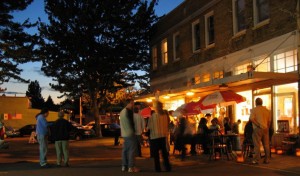
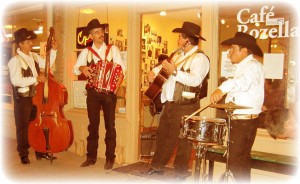
Although descriptions of White Center often include the adjective, “gritty,” the reality is that the neighborhood has, in recent years, changed considerably. Not long ago, prostitutes flaunted their wares throughout the area, drug markets operated openly, drunkards stumbled from tavern to tavern and ruffians roamed the area like extras in a Mad Max movie. As Herb, the owner of Central Heating on Delridge, put it, the stretch from his business on Cambridge to Cafe Rozella was a freeway of drugs and prostitutes. I, who have seen some rough neighborhoods, would not step out of my car on the stretch of 16th Ave south of Roxbury. As far, as I was concerned, this was a no-man’s land of losers and predators. I am not sure how the area became so blighted but part of the reason lies in its netherworld as a piece of unincorporated King County. In many ways it was the lawless wild west.
White Center was changing before we decided to open Cafe Rozella in 2004. King Country Sheriff’s Deputy, Steve Cox was well underway in his campaign to clean up the neighborhood. The community had been up in arms against the criminal element for some time.
I grew up in the south side of El Paso, Texas, where biculturalism is a norm. As well, there were some pretty rough areas and you had to hold your own in a fight. So when Leiticia and I looked at White Center as a location for a traditional coffee house, one that would honor the best traditions of the European gathering place, we were not put off by the rich medley of cultures. To the contary, we embraced the immigrant communities who were opening up markets, restaurants, Pho shops, fruit stands, taquerias and carnicerias. This melange of people were in the process of changing the character of White Center.
In 2003, we scouted out a location for our cafe. After much searching, we found a lovely gem of a building sitting unadorned in the heart of White Center. We decided that the Rozella Building would be perfect for what we had in mind. The Rozella Building was built by Italian immigrants and named after Patriarch’s daughters. Good kharma there.
As we took possession and started the demolition before the build-out, we started to get a taste of the old White Center. Every morning, as we got to work, we would find used condoms, needles, malt liquor cans, and other paraphernalia of the sordid in front of the building. A resident of the apartments upstairs, told us that four people had died in the aparments in the last year, mostly from acute alchohol intoxication. Doug, from Center Tool Rental informed us that his alarm went off so many times, he was getting sick of being fined by the police who often arrived after the miscreants had left. At least two of the upstairs apartments were notorious drug dens and homes for alcoholic denizens looking for a place to pass out. The laundry room was used by prostitutes to take care of their clients. And the gangbangers regularly parked in front of the building, hip hop blasting, cold stares at my crew of workers. Yes, this was going to be a project.
As patrons of the cafe know, we have an outdoor sidewalk cafe with tables and chairs. Drunkards saw the outdoor cafe as just another place to squat while they downed their cans of malt liquor. When you are as large as I am, it usually doesn’t take much convincing to get these guys to move on. But occassionally, one would mouth off and refuse to leave. I found it effective to grab their cans of liquor and squash them. A couple of times they would lunge at me and I would push them into the cement. This eventually discouraged vagrancy.
The prostitutes usually showed up on the weekends. I would take out my digital camera and say, “hey, how’d you like to be on the web?” The pictures were emailed to the Sheriff.
The gangbangers were a little more difficult. Lucky for us, Deputy Cox was quick to respond with a couple of extra deputies. “Ricardo, you want me to move these guys out?” he would ask. But by this point, the sight of three patrol cars was enough to scatter them like roaches in light.
More pernicious still were the dealers upstairs. They had a good gig going and they were not about to let it go — easily. I shot pictures of their customers, and of the dealers and passed them along to Steve Cox. Still, these guys were obstinate. Even friendly visits by Cox and his deputies would not convince them to shut down. One of them was especially mean and violent and he not only threatened me but also that big rock of a man Steve Cox. Weed and Seed folks talked to the landlord and finally convinced him to start removal actions. The landlord would invariably ask me to serve the legal papers as he was too frightened to do it himself. A couple of times, Deputy Cox and his deputies had me go do a knock, as they searched for cons with outstanding warrants. It was a rush.
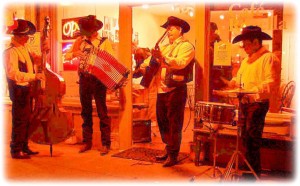
During this time we had the support of the community, including Russell Parks, Betsy Harris, Peggy Weiss, Melinda Bloom and the weed and seed folks, amongst others.
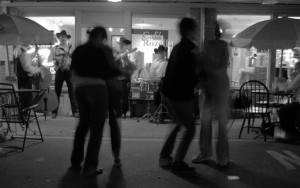
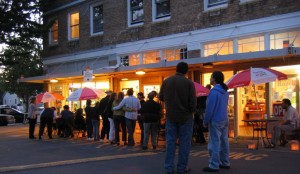
But what really changed the course was the cultural events that we began to sponsor. Shortly after opening, we had a Brazil night and a Mexican Independence Day celebration. For the latter, we hired a wonderful conjunto band from South Park. The place rocked. People were dancing outside of the cafe on a Friday and Saturday night. Nobody had seen anything like this in White Center. It was a blast.
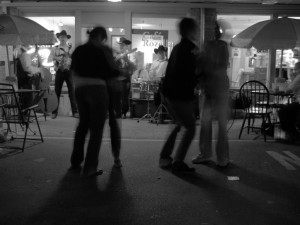
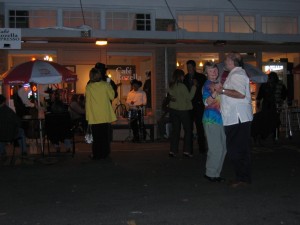
During the summer we started having at least one weekly musical performance in front of the cafe. Where once the place was littered with vagrants, prostitutes, drunks and dope dealers, we had families and children enjoying the music, frolicking and dancing under the stars. Surprisingly, there was resistance from some of the old timers in the business community. But the community loved it. We followed up with poetry readings, a writers’ group, a conversation cafe and other cultural affairs. Things changed and the continue to change.
White Center tasting event at Full Tilt: Beer and ice cream, together at last!
February 2nd, 2009 Tracy Posted in Full Tilt Ice Cream, White Center, White Center news 2 Comments »
From White Center Now‘s own Justin Cline @ Full Tilt Ice Cream – this news release announcing an event coming up March 1st:
One scoop or two? How about a brew?
Full Tilt Ice Cream, one of South Seattle’s most interesting new small businesses, is joining forces with another local innovator, Laughing Buddha Brewery, to give Seattle palates an evening of exotic bliss. On March 1st, Laughing Buddha brewmeisters Joe Valvo and Chris Castillo will be on hand at Full Tilt to showcase selections from their new line of Asian-style beers, including brews with names like Purple Yam Porter, Mango Weizen and Pandan Brown Ale. While there, Joe and Chris will also be answering questions about craft brewing and discussing their quest to bring the flavors of Asia to the Seattle beer scene.
After quaffing samples of beer, visitors can try some of Full Tilt’s similarly unique and inspired ice cream and sorbet flavors, including: pandan (a Southeast Asian leaf with a nut-like aroma), ube (also known as Filipino purple yam or Okinawan sweet potato), ginger, and lychee.
In keeping with the “meet the producer” theme of this event, Full Tilt owner Justin Cline will be talking about the art of making craft ice cream while he’s scooping you out a dish or coneful. If the ice cream and beer flavors aren’t stimulating enough, you can even try a game of pinball at one of Full Tilt’s 16 vintage pinball machines, or check out one of the local small-circulation “zines” on the reading shelf.
Full Tilt is to ice cream what Laughing Buddha Brewery is to beer: both are craft establishments that use exotic ingredients rarely found in Western-style cuisine. These two local businesses are expanding the world of flavor in ways that no one else is doing, so don’t miss the chance to experience both of them in a single visit.
This happens at 3 pm March 1 at Full Tilt in downtown White Center.
One-night homeless count: 39 in White Center
January 30th, 2009 Tracy Posted in White Center, White Center news Comments Off on One-night homeless count: 39 in White Center
Here’s the spreadsheet from the King County Coalition on Homelessness – the overnight check found 39 people in White Center – 29 of them sleeping in cars or trucks. Overall, in the comparable “selected” areas of King County they canvassed, the volunteers found 2 percent more people than last year – 2,684, up from 2,631 – but the total number they found was 2,826.
White Center celebrates Tet: Happy Year of the Ox!
January 26th, 2009 Tracy Posted in Fun, Holidays, White Center 4 Comments »

Thanks to JB for sharing these photos of the Tet celebration at White Center’s Cafe Tam Thanh. We welcome your photos any time – whitecenternow@gmail.com – thank you!


Microsoft Plans Layoff of 5,000 employees – impact on White Center uncertain
January 22nd, 2009 Ricardo Posted in Economy, Jobs, White Center 1 Comment »
No doubt you could have gotten this piece of news from the front cover of the New York Times or the Seattle Times. Apparently 1,400 of the initial cuts will come from the Seattle area. Here at Cafe Rozella we have quite a number of MS employees who use the cafe as their third office. The layoffs will significantly impact White Center and West Seattle. I have some calls out to some economists to give us a gauge of just how hard this will impact us. But make no mistake about it, this will have an adverse impact on Puget Sound are and White Center.
Make no mistake about it, this is bad news for Microsoft and the Seattle area. Since Microsoft got a license to print money in the mid-80s, it has never contracted. As if you needed another indication that this is not going down well, MS stock went down after the announcement. The money people view this as a portent of further ills to come. And even Ballmer, who never fails to spin a positive tale out of anything, was pretty circumspect in his outlook. Bottom line is that we are seeing a period of negative growth for Microsoft.

